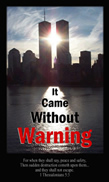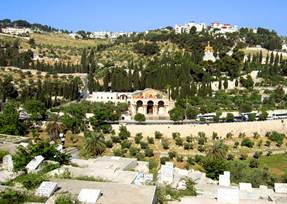



“Therefore watch, and remember, that by the space
of three years I ceased not to warn every one
night and day with tears.”
Acts 20:31
The Bible states with absolute clarity that the events surrounding the end of the age and the return of Jesus Christ will come as a great surprise to the vast majority of people on earth, even to many within His Church (Mt. 24:42-42, 1Thes. 5:2, 2Pet. 3:10. Rev. 16:15). The scriptures also reveal that although it will be a surprise to many, IT WILL NOT COME WITHOUT WARNING.
God believes in warnings. He does so because it is a part of His fundamental fairness. He is a God of great mercy—and unlike a terrorist, He does not rejoice in calamity. In short, you will never see Him dancing in the streets when man suffers, even when man suffers at His hand (Ezk. 18:23, 33:11).
Furthermore, the Almighty has no desire to “sucker punch” mankind. On the contrary, The Great God of Heaven is committed to extending to His human family every chance possible to avoid the horrible devastation that will come upon this world. The bottom line is this—God believes in warnings. The Bible is a book of warnings. It records in great detail what the world will be like in the last days and the specific steps the Creator is going to take to prevent man from destroying this planet.
The Olivet Prophecy
One of the most powerful descriptions of the end time was given by Jesus Christ to His apostles just days before His crucifixion. This prophecy is arguably the most famous warning ever uttered by the Messiah. It is recorded in great detail in three of the four gospels (Mt. 24, Mk. 13, Lk. 21).

The Mount of Olives. David wept there over the rebellion of his son Absolom (2 Sa. 15).
Jesus spoke of the last days to His disciples there (Mt 24)
When Jesus gave this prophecy, He was in Jerusalem preparing to keep His final Passover. While there, His disciples were showing Him the temple and commented regarding how magnificent it was. The gospels of Mark and Luke indicate that the disciples were marveling at the stones used in its construction (Mk.13:1; Lk.21:5). Jesus then made a pronouncement that must have rocked these men. Notice what He said.
And Jesus said unto them, See ye not all these things (the stones the disciples had just shown him)? Verily I say unto you, There shall not be left here one stone upon another, that shall not be thrown down. (Mt. 24:2)
This prediction by Jesus is even more remarkable when one considers how massive some of the stones of the temple were. The great Jewish historian Josephus wrote of single stones that were 40 cubits long and pillars that were 25 cubits high. (See Josephus, War of the Jews, Book V, Ch. v.i.). And in one sentence, Jesus said they were all coming down.
When the disciples heard these words, they couldn’t contain themselves. They followed Jesus out of the city, across the half-mile wide Kidron Valley to the Mount of Olives. It was there that they pressed Him to expand on His shocking statement. The disciples began by asking Jesus a very pointed three-part question.
And as He sat upon the mount of Olives, the disciples came unto him privately, saying, Tell us, when shall these things be? And what shall be the sign of thy coming, and of the end of the world? (Mt. 24:3)
What would follow on that spring day in Judea were words of uncanny precision and insight. Jesus laid out a picture of life in the last days that could be read in any newspaper today and scarcely draw a raised eye. But the Messiah spoke these words over nineteen centuries ago and when doing so acknowledged He was describing the end of the world. His words reveal a genuine reason for this particular generation to be deeply concerned. They included a series of warnings concerning religious, political, social, and environmental conditions that would grow worse in intensity until they would reach a state that would threaten human survival. But Jesus also spoke of deliverance to those few who would truly heed His warning.